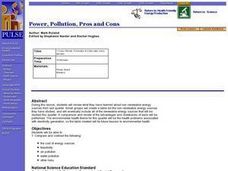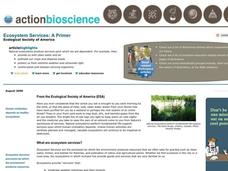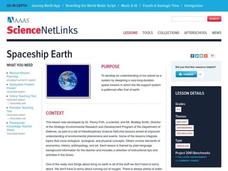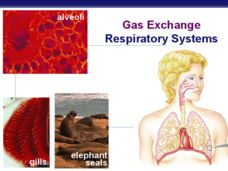Curated OER
Hatching Brine shrimp
Second graders investigate the life cycle using brine shrimp as an example. They conduct observations by watching the shrimp hatch out of cysts. Students design simple experiment to structure an observation. The experiment is approved...
Curated OER
Power, Pollution, Pros and Cons
Learners review what they know about non-renewable energy, compare and contrast advantages and drawbacks of each type, such as cost of energy sources, feasibility, air pollution, water pollution, and other risks, and create table listing...
Curated OER
When Fish Die
Students discuss what to do with a very sick fish and help it to die without much pain. As a class, they answer questions about the fish and if they believe it is suffering or not. Using their own experiences, they share how they dealt...
Curated OER
Selecting Soil Organisms in Compost
Pupils demonstrate that many of the enzyme systems needed to break down--and therefore clean up-society's wastes already exist in nature among the decomposers. They select the best starch-munching organisms by altering the environment in...
Curated OER
Caterpillar Habit
Young scholars watch a caterpillar change and become a butterfly. In this lesson about the life cycle of a caterpillar and a butterfly, students prepare and maintain the habitat of the caterpillar. Young scholars observe the stages of...
Curated OER
Helping plants grow well
Students explore the effect of water, temperature and light on plant growth. Students are asked if they remember the LAW for plants. This is Light, Air(temperature) and Water, which all plants need for growth. Students are divided...
Curated OER
Changing State
Pupils participate in an online instructional activity to investigate the effects of cooling and heating on water.
Curated OER
Keeping Warm
Students place words describing a range from cold to hot on a scale. Using those words, they identify places on Earth which are cold, hot, freezing or boiling. They practice using and reading a thermometer with three different beakers...
Curated OER
Changing Sounds
Students identify how the pitch of an instrument can be altered. They complete a worksheet by labeling several images in order of pitch and then fill a bottle with water to create a sound that matches a pitch on a drawn card.
Curated OER
RIDE THE WILD LEAF
Learners identify and interpret that leaves provide food for new trees and plants. Students cut out leaves and glue them on the appropriate
number on included worksheet. Learners collect different types of leaves and make leaf rubbings....
Curated OER
Plant Growth
First graders investigate how seeds are moved and how plants grow. In this plant growth instructional activity, 1st graders listen to stories, play a game, and view a PowerPoint about plant growth. Students examine various seeds...
Curated OER
How Much Is an Ecosystem Worth?
Students examine the value of ecosystems. They read and analyze an article, evaluate ecosystem services, research the benefits of biomonitors, and design a public service announcement.
NOAA
Currents
Learn how ocean currents are vital to humans and marine life. The eighth installment of a 23-part NOAA Enrichment in Marine sciences and Oceanography (NEMO) program, focuses on ocean currents and how they affect global climate. The...
Curated OER
Spaceship Earth
Middle schoolers develop an understanding of our planet as a system by designing a very-long-duration space mission in which the life-support system is patterned after that of earth.
Curated OER
Sky Observations Sky & Cloud Windows
Students observe the sky and weather to gather data. They conduct experiments to answer questions about the sky and weather phenomena. They measure, analyze and present data. They create sky windows by gluing sky colored paint chips...
Curated OER
Landfills: A Solid Waste Management Plan
Young scholars are able to list the types of household waste that they produce daily. They are able to describe some other types of waste that are produced by industry or agriculture to help maintain their lifestyles. Students are able...
Curated OER
Worms! Nature's Recyclers
Third graders explore the process of composting. For this composting lesson, 3rd graders read the book Wonderful Worms, and create composters.
Curated OER
Dangerous Air
Students investigate how pollution is a global issue. They locate the countries affected by radiation from Chernobyl, sequence the progress of radiation transport from Chernobyl and plot the pollution points on a world map, and read and...
Curated OER
Elements for Disaster Reporting
Students identify the elements of natural disasters and gain an understanding on how the media influences people's responses to disasters. In this natural disaster lesson plan, students study the impact of natural disasters, and the...
Curated OER
Making a Rainstick
Students construct a rainstick. In this music lesson, students investigate the history of the rainstick by reading the book Bringing the Rain to the Kapiti Plain by Verna Aardema. Students express their feelings about the rain and create...
Curated OER
Gas exchange: Respiratory Systems
The need for a respiratory system in humans versus being reliant on gas exchange structures is demonstrated. There are many details about the advantages and disadvantages of each mechanism. Students are able to learn about the...
Curated OER
Ecosystems and Remote Sensing
Students obtain remote sensing data to compare and contrast global biomass data with global temperature data.
Curated OER
Breaking it Down
High schoolers will identify the factors that contribute to erosion and weathering. They will start by differentiating between chemical and mechanical weathering. They then apply what they learned by playing the online jeopardy game. Key...
What affects Frog metamorphosis?
In this lab, students explore pollutants which affect frog metamorphosis using household pollutants (vinegar, oil, and bleach) and sponge capsules.























